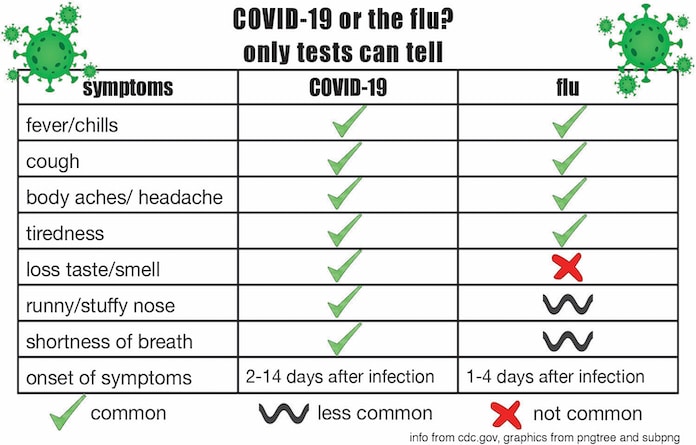Flu season is among us

With the recent COVID pandemic, other illnesses can be overshadowed.
Now that the season is approaching, Monroe County Health Department Administrator John Wagner discussed projections for this year’s flu season.
Get vaccinated now
Wagner said flu season typically runs from October until March or April, with it beginning later in the past decade.
“Just like our winters have been coming later over the past couple of years, the flu has been following that trajectory, so we don’t want people getting the flu shot too early,” Wagner said. “Now is a good time, because you’ll be covered even if we do go into early spring with the flu still being around.”
He explained that flu vaccinations, no matter the manufacturer, typically provide 5-6 months of “good coverage.” Inoculated individuals will still have some protection, just a lesser amount after it wanes.
“If anybody wants to get vaccinated, go ahead and get it now,” Wagner said.
In addition to local pharmacies such as Walgreens, CVS, Walmart and more, the Monroe County Health Department also administers flu vaccines. It plans hosting a clinic on a weekly basis at its office, 1315 Jamie Lane, Waterloo.
The health department is unable to bill private insurance for these. As such, prices are firm: Flublok vaccine is $65, standard flu vaccine is $30 and pediatric flu vaccine is $10.
High dose for elderly
Wagner noted there are multiple manufacturers of the flu vaccine, along with different “types.” The health department sources its vaccines from multiple manufacturers.
He said those ages 65 and above are usually recommended for a “high dose” vaccine.
“People over 65 need the high dose basically because their system has been so used to the flu vaccine over the years, (so) if you give them a shot, their body says, ‘I’m not going to ramp up, basically. I know what this is, I’ll protect you from it.’ So the high dose supposedly then triggers in the elderly a better response,” Wagner said.
Flublok will satisfy this “high dose” need, Wagner said.
A detailed breakdown of different kinds of flu vaccines can be found at cdc.gov/flu/prevent/keyfacts.htm.
Effectiveness may vary
As the CDC explained, flu vaccine effectiveness can vary based on the “match” between the flu virus one is infected with and those the vaccine targets.
According to the CDC, when circulating flu viruses are most “well-matched” to those in the vaccines, “flu vaccination reduces the risk of flu illness between 40 and 60 percent among the overall population.”
Wagner said areas of the globe which experience winter, and therefore flu season, earlier than others are used to help determine which viruses will be used to make vaccines.
He said even if the vaccine is not “well-matched” to the flu variety one catches, it is still beneficial to be vaccinated.
“The flu vaccine will definitely help no matter what, but it does a better job of protecting you if they match it closer,” Wagner said, later adding, “(Even if) it’s not the exact variant that has developed, your body still increases its ability to fight it off because it’s still the seasonal flu.”
The CDC said one’s age and health may also influence how well a flu vaccine will protect them.
COVID-19 and the flu
Wagner said the flu and COVID, particularly with the rise of the Delta variant, can make it hard to differentiate the two.
“There are certain symptoms that are more prominent with the flu than with COVID, but with the Delta variant, especially with kids, we’re seeing a lot of the stomach issues and stuff which are normally associated with the seasonal flu now (being) COVID symptoms,” Wagner said.
He therefore urges those who feel sick to get tested for both the flu and COVID.
“Once you’re sick, you need to get tested for both,” Wagner said. “You can’t just be tested for one and assume that, ‘OK, that’s what it is,’ because it is possible to have both.”
And no, the COVID-19 vaccination will not prevent the flu and vice versa.
When coupled together, COVID safety precautions will help prevent the spread of the flu, Wagner predicted.
“I think we are going to see a decrease this year over a normal year,” Wagner said, “People are really aware now of washing their hands just because COVID has been around for 1.5 years now … there’s no question that masks do some good, it’s just how much good (is unknown).”
Because of this, Wagner said masking will be best effective at preventing the flu when practiced along with other sickness prevention strategies such as hand sanitizing, not touching one’s face and limiting the amount of surfaces one touches.
For more information on the flu and COVID, visit cdc.org.






